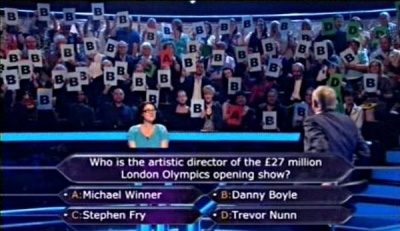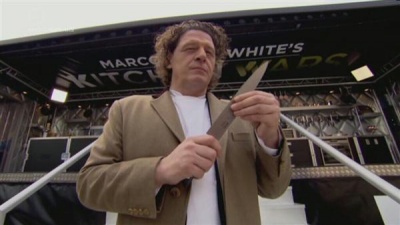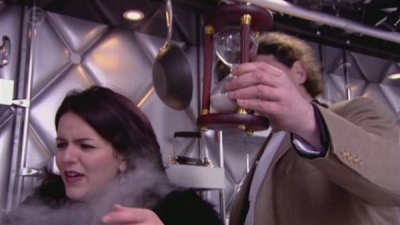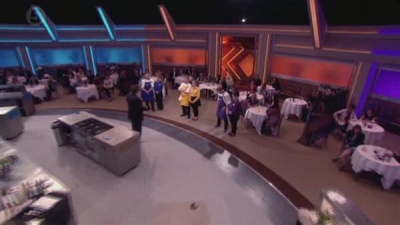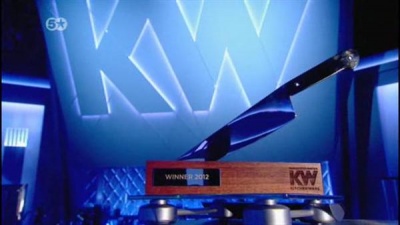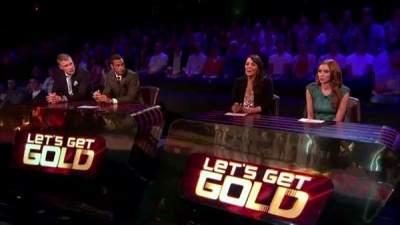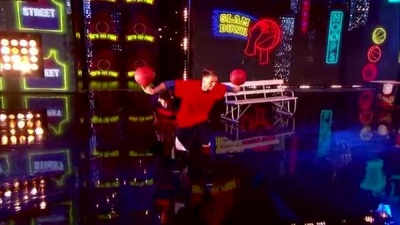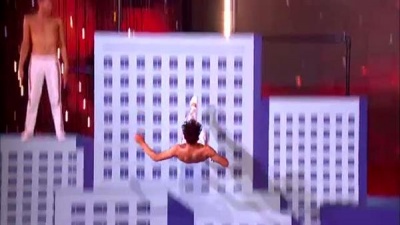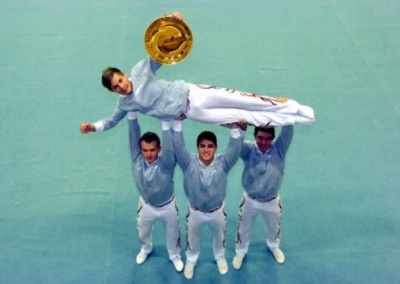Weaver's Week 2012-07-15
Last week | Weaver's Week Index | Next week
The perils of live television were shown on this week's short run of Who Wants to be a Millionaire. Ask the Audience relies on two hundred electronic keypads working. When those two hundred electronic keypads think, "right, we've propped up this show for fifteen years and no-one cares about us" and pack in, there is a replacement to hand. Hold up some pieces of coloured cardboard. Ah, no-one does live telly like Chris Tarrant.
Contents |
Kitchen Wars
Channel 5 for (er) Channel 5, from 7 June
Is that an in-house production by Channel 5? It most assuredly is.
Now, readers will doubtless be familiar with competitive cookery. The Week doesn't dip into this field very often, because there are a lot of shows, they tend to meld into one another, and they're not the sort of thing we choose to watch anyway. Kitchen Wars will just about prove our points.
The show begins and ends with Marco Pierre White. He's one of the modern breed of celebrity chefs, people known for being able to whip up a decent meal out of a bag of nails and some cut grass. His gimmick is to walk around with a big vegetable knife, jabbing it into things to assert his dominance and status. You wouldn't catch them making that sort of gesture on Junior Bake Off.
Round one – the first two of the seven-programme series – was the travelling circus. Britain's Got the Kitchen Wars In The Back. The programme pitched up in some of the UK's largest cities, and people came along to cook for Mr. White. Except it wasn't just any person, invitations were only extended to restaurateurs. They'd applied in pairs, one cook and one front-of-house person, and the competition was only open to people who ran their own eating place. The rules were liberal on "restaurant", the show was open to "any establishment which prepares and serves meals (including a cafe to a high-end eaterie)", but wasn't open to chains of more than four restaurants.
None of this was made clear in the programme, which is a bit naughty. But anyway, these people turned up, and had 30 minutes to cook a meal for Mr. White. During this time, he got a bit bored, and started chattering to the front-of-house person, and to the cook, and going down to the crowd because Channel 5 couldn't afford to send an actual presenter, all they'd got was Caroline Quentin doing an obviously after-the-fact voiceover.
Half-an-hour expired, and Mr. White ate whatever was put in front of him. If it was up to scratch, and he saw potential in the couple, he would put them through to the studio rounds. Much was made of the way there were only twelve places in the studio rounds, and all twelve would be filled, and if Mr. White saw someone good he might have to turn them away, and didn't we have something similar on will.i.am Sends An SMS? It's contrived tension, it's entirely fake tension, and it wasn't actually all that tense.
Anyway, two episodes of this proved quite enough, so we'll pick up the story in the Battle Kitchen. It's introduced by shots of the competitors travelling in limousines past all sorts of London landmarks. Tower Bridge, Westminster, Wembley Building Site, the queue for The X Factor, that sort of thing. Any comparisons with the gratuitous travelling scenes in The Apprentice are surely deliberate.
Being the kind and caring person, Mr. White has provided a kitchen junior to augment the chef and server. He's also provided equal portions of some ingredient for the main course, and an equal budget for a starter and sweet. At the end of the show, there will be 25 people to feed, and a strict time limit in which they're to be fed. "It'll be one of the toughest services of your life," says the titular cook, subconsciously channelling the catchphrase from Masterchef.
The rest of the programme goes out in a predictable fashion. By a process of editing and narration, the smallest glitch is built up into a giant molehill that the competitors will need to scale, or not. Mr. White will stick his oar (or his knife) in to all of the competitors, offering his advice. And as he's the judge and jury, if Mr. White says something, he is going to be right, even if an impartial panel of peers would find him wrong.
Have we mentioned how much we dislike this cult of celebrity? The on where the expert must be placed on an ivory throne, and must be heard and obeyed. Even though they rose up by proving wrong the already powerful, those who are now powerful are always right, and argument is futile, resistance is useless. Yeah, that one. It's an assumption that power is permanent.
Before we can draft a manifesto for Occupy The Kitchen, the cooking time ends, and a winner is declared. The editing and commentary have given away the result almost from the start, it's no tremendous surprise. Perhaps the biggest surprise in the entire show is its sponsorship arrangement, with a German supermarket that trades on its low prices, and is generally associated with low quality produce.
We spent most of the shows thinking about other things, like whether we remembered Hell's Kitchen well enough to compare it against Kitchen Wars, and decided we didn't. As a reality programme, Kitchen Wars is just about, sort-of, OK-ish. If there's nothing better on, which there usually is at 8pm on Thursday.
Let's Get Gold
Thames / Superhero for ITV, 5-7 July
Readers will probably have missed the publicity for a travelling jamboree of international understanding, common cause, and ensuring that everyone pays their full part to civic society. We know we have. While we wait for the Invisible Pink Unicorn to ride into town, we're left with programmes like this.
Vernon Kay is the host, a man famed for his ability to front almost any programme on ITV. Joining Our Vern are four celebrities. the likes of which we've not seen in, ooh, about a week. The celebs neatly fall into two pairs. Martine McCutcheon and Una Healey are "showbiz", because they've been entertaining people for many years – Martine is best-known for her role alongside Barbara Windsor in Bluebirds, Una for her role alongside Frankie Sandford in pop group The Saturdays.
"The sportsmen" are Freddie Flintoff, an England cricketer; and Rio Ferdinand, a footballer and fan of the movie "Liar Liar"*. The role of these celebrities is never quite made clear. It's generally acknowledged that they are good in their field, with Flintoff once described as one of the world's top five bowlers, and Healey described as one of the world's top five Saturdays. But in the run of the show, all they contribute is words.
These celebrities are the draw, the magnet to drag in a huge and massive ITV audience. They're not the stars of the show. That honour falls to fifteen groups of competitors, each representing a sports club somewhere in the UK. The combination of sport and entertainment is completely alien to ITV, who prefer to show hour after hour of The 1% chasing after a ball inflated by their own egomania. But enough of Chelsea FC. Let's Get Gold is billed by Vernon Kay as "spentertainment". Unfortunately, that's also a contraction of "spent entertainment", which might more accurately reflect the programme.
Each sports club got about eight minutes of attention in the show. A two-minute video piece was followed by the actual routine they'd put together. The routines were clearly edited down – cutaways to the panel tend to suggest it's not live, and the use of stop-frame bullet-time rotation (as seen on The Cube) is a pretty big giveaway. We've absolutely no objection to this: the show isn't live, there's no compelling reason for it to be live, and the extra video effects really add something to the experience.
Sadly, we can't say the same about the rest of the performance – the piece feels as if someone wasn't paying enough attention in rehearsals, too often there's a very wide shot when something dramatic is being done, and we don't quite see it in enough detail to appreciate it. The audience tells us they saw it, they got it, but we viewers were left out. We're also patronised by the "Power Move", a stunt towards the end of the routine that is meant to shake us to our foundations, except we see it coming from the preamble video, and the words "Power Move" appearing in ugly writing at the top of the screen.
After each performance, the celebrity panel opens their mouths, and some words come out. Each of them falls into the characters they've carefully carved out: Freddie Flintoff is a cheeky chappie, Martine the cockney sparrow, Una says something that makes sense when we think about it, and Rio dances on the sand. From time to time, one of the panel will step up to the stage and join in a stunt: will the stunt cyclists be able to manoeuvre themselves so that they don't injure Ferdinand's tackle?
Eventually, the panel gives their opinion of the act. It's distilled into a very simple mark: gold, silver, or bronze. We're very pleased to see the scoring system from Comic Relief Does Glee Club return, and on almost as high-profile a production. Afterwards, some or all of the members of the club reflect on their performance, and their discussion with the panel. The show ends with the audience voting for their one favourite performance of the night, and that winner progresses to the end-of-series final.
Now, we have one problem: how on earth can we compare stunt golfers with trick BMX riders with agile gymnasts? The fact that we're experts in none of these fields might actually make it easier, we can assume that all of the routines will represent decent sporting skill, and judge them on their entertainment potential, how much we were wowed by the presentation.
Even so, we really got a feeling that Let's Get Gold was an opportunity missed. Eight minutes for each club was just a bit too brief to appreciate their work, and some of the routines were clipped to about 90 seconds so as to allow for greater banter with the celebrity panel. We weren't watching for the celebrity panel. Four performances, and ten minutes per club, would have pleased us a little more, though it wouldn't have allowed for such a neat show. The panel and host were familiar faces, perhaps too familiar: these performers aren't novelties, they feel a little as though they were chosen primarily for being available. We also got the impression that the final wasn't meant to directly abut the last heat, and the series would work well if spread across a working week – four or five performances on each night, leading up to a weekend final.
The eventual winners were Acropolis, a team of acrobatic gymnasts from County Durham. They won £100,000 for their club; all the competitors got some exposure on national television. Will it have inspired people to take up sport? Perhaps not. Will it encourage these sporting entertainments? It just might do. Are we likely to see a second series? We'd be very surprised: the typical tenor of other reviews has been "Let's Pretend This Never Happened", and even we doubt we'll remember the show for the end-of-year polls.
This Week And Next
Oftentimes, we want to throw things in the direction of OFCOM, because we think they're making the wrong regulatory decisions. But every so often, their bulletins are classics of civil service criticism, more cutting for its quiet diplomacy. This week's edition contains a remarkable contribution by Al-Alamia TV, their Miss Arab London contest was – in compliance terms – an Epic Fail. Premium-rate entries phone lines were misconnected at random, numbers were shown for contestants who had pulled out, and lines remained open after the closing time. But wait! There's more! The station couldn't add up the votes correctly. Even though the votes had been counted (wrongly), they hadn't been verified because there was no verifier – no third-party auditor had been employed. And, just to add insult to injury, the shows included advertorials for sponsors. OFCOM drily notes,
- "It appeared that the Licensee did not consider it appropriate to research its compliance obligations before embarking on the production of a series which involved extensive commercial arrangements, national and international premium rate service telephony and a live broadcast."
It's almost as if they shouldn't have been licensed in the first place, but OFCOM isn't allowed to refuse licenses to anyone without a very good reason. This may count as just such a good reason.
The regulator also ruled on Keith Lemon's LemonAid. Not the fact that ITV had chosen to broadcast such drivel when they could have commissioned another series of Sing If You Can, but in response to 237 people moaning about offering a puppy as a prize. What the show didn't broadcast was the care ITV had taken: a vet had visited the family homes, they all actually wanted a dog, and the producers ensured the pups were well cared for. In dismissing the complaints, we're left with the feeling that ITV brought this upon itself:
- "OFCOM notes that ITV took the editorial decision not to inform viewers of the measures it took to ensure the welfare of the puppies. This may have contributed to the concerns of some viewers about giving away a puppy as a prize. If viewers had been made aware of some of the steps taken by the Licensee, this would have provided assurance that careful consideration had been given to the puppies' welfare. OFCOM therefore advises broadcasters, where the welfare of animals featured in a programme may cause concern to viewers, to consider broadcasting appropriate information to help protect viewers from offence that may result from withholding that information."
In short: don't tell people you're doing the right thing, *show* 'em. It's basic television scripting, folks! Would we rather have seen two minutes of people being lovely to puppies than five seconds of Peter Andre? Very possibly.
Channel 5 are clearly doing something right, there are formal investigations into Big Brother on 25 June, and Bit on the Side on 4 July. Other reports suggest the former is about one of the lab rats having a racist, sexist, and violent rant at another lab rat, and that the sponsors are thinking about withdrawing. The latter is reported to be about a slur from a 2004-vintage lab rat. There's also an investigation into Love Shaft on Channel 4. We believe this to be the Saturday repeats, and note that OFCOM has slapped down UK Gold for broadcasting innuendo at about 10 on Saturday mornings.
Ratings for the week to 1 July are, quite frankly, a mess. ITV's figures are completely unavailable, and those for BBC1 claim that 5.85m people saw Secret Fortune even though it was pre-empted by the tennis. The top figure we have is for a game show that actually went out (and this may have been The Chase's week) is Mock the Week, itself postponed from Thursday to Sunday, when 1.9m people saw it. Big Brother had 1.75m on Thursday, and Come Dine With Me finished third with 1.7m. The new series of The Bachelor (850,000) fell behind the top score for Newsnight (900,000). Slim pickings further up the EPG: 485,000 for A League of Their Own, 465,000 for Come Dine on More4, and 420,000 saw QI XL on Dave.
The intelligent game show baton is handed from the Counterpoint final (Radio 4, 3pm Monday) to a new run of University Challenge (BBC2, 8pm Monday). There's Have I Got Sport for You on the wireless (Radio 5, 6pm Sunday). It's also the grand final of Kitchen Wars (C5, 8pm Thursday), and there's a daily diet of Superstar (ITV, 8pm Sunday, 9pm weekdays). The civilian series of The Million Pound Drapp Live has ended, but it runs straight into a celebrity edition (C4, 9pm Friday, 7.10 Saturday)
To have Weaver's Week emailed to you on publication day, receive our exclusive TV roundup of the game shows in the week ahead, and chat to other ukgameshows.com readers, sign up to our Yahoo! Group.

